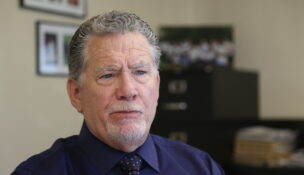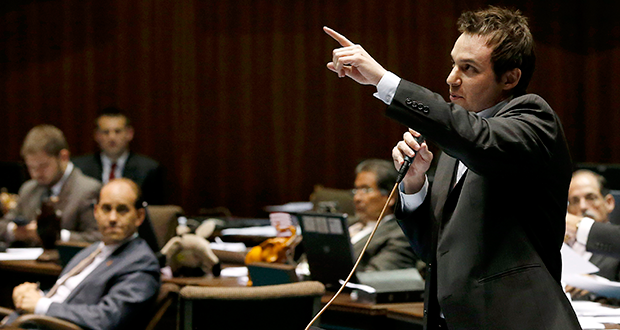Chad Wilson: EVIT and Arizona’s future workforce
Kiera Riley Arizona Capitol Times//October 12, 2025//
Chad Wilson: EVIT and Arizona’s future workforce
Kiera Riley Arizona Capitol Times//October 12, 2025//
Across the East Valley Institute of Technology campus, chefs prepped a meal, auto mechanics wheeled under lifted cars, welders stood behind a veil of sparks and hairdressers snipped at stray ends.
At each step of an impromptu tour of the Career and Technical Education District, Chad Wilson, EVIT superintendent, showed students forging a future job in real time. Amid all the unfolding career paths, Wilson sat down with the Arizona Capitol Times to reflect on his own, from the classroom to an ultimately unsuccessful indictment to his role at the helm of an organization dedicated to student career readiness.
Career and Technical Education focuses quite a bit on paths — so what was your path to where you are now?
I’m going to tell you the whole story. You take it for what it’s worth. Some people tell me I shouldn’t tell this whole story, but I think it’s a fascinating story.
I’m originally born and raised in Tucson. My dad was a superintendent down there. I graduated from the UofA and didn’t really know what to do, right? And so my dad suggested, what about education? Because that’s where he spent his career, and because I really didn’t have any plan, I said, OK, that makes sense. I never intended for my career to be in education. But when I started teaching, I just loved interacting and working with kids – I loved it, and I never intended to be an administrator, either, right? But an opportunity presented itself, and I took advantage of it.
I was offered an assistant principal position out at Apache Junction … I loved it. I loved the action in high school. I loved the dynamic in high school. I was a high school assistant principal, then a high school principal. I later became the assistant superintendent of Apache Junction and then the superintendent of Apache Junction.
As a superintendent, what winds up happening is that I work for a governing board. If the governing board changes, or the governing board doesn’t want the superintendent, then you move on, right? Well, my governing board did change, and so I decided that it was time to leave. So I left and came over here as the assistant superintendent.
One of the unfortunate things coming out of (Apache Junction) is that some of the decisions I made, folks didn’t appreciate, and long story short, some discussions with the Auditor General’s Office and the Attorney General’s Office about me ultimately led me to being indicted by a grand jury on four felonies.
(Wilson was indicted in 2019 on one count of theft and three counts of misuse of public monies)
During that same period, the superintendent who was here left, and the governing board here appointed me interim superintendent. However, I was indicted. The governing board here, I owe them more than they will ever understand, because they said, “Just because you’re indicted, doesn’t mean you did it. Anybody can have an indictment.”
Four months later, the charges against me were dismissed, and I was reinstated as superintendent. And I’ve been the superintendent here for the past six years.
What about EVIT stands out to you?
Our faculty and staff here are amazing. (About) 98% of them have come straight out of business and industry. Go to the welding and all those instructors down there are professional welders who’ve been in the industry, and the way they conduct their class, and the way they conduct their environment is like what you’re going to find in a welding shop. If you go into our CNA program, our RN program, all the instructors are nurses, and they’re going to conduct that like you would in a hospital. And so, because of that, they create a much more engaging opportunity for kids.
Our governing board puts students first; our faculty and staff put students first. The work that we do is tangible. You can see the real outcome. Your industry certification, which allows you to be hired at a salon upon completing cosmetology is a real, tangible outcome, and I really appreciate that at this stage in my career. I spent many years in a traditional K-12 system that I believe in, but that traditional K-12 system often doesn’t have a tangible outcome. It’s a preparation for something, but the tangibility of it is really difficult. Here, you see it.
What has guided your work with EVIT?
One of the things that was important to me when I became the superintendent is that we anchor ourselves to something. Most organizations have mission statements, visions and other elements. Although that is good, I’m not very much about what you put on the wall. What I am about is how you conduct yourself every single day. And so, what we anchored ourselves to, and still anchor ourselves to, is the idea that at EVIT, we change lives by loving our students and serving our communities. That’s what we do.
When we talk about loving our students, it’s not just an emotional feeling; it’s more about the kind of agape love that I’m going to show you without expecting anything in return, and I’m going to take that next step without expecting anything in return. We anchor ourselves to the idea that if we’re going to become who we expect ourselves to be, there’s no greater motivator or anchor than love.
What changes have you overseen as EVIT superintendent?
Before I became superintendent, there were certain requirements that students had to meet to attend here. So, for example, you had to have a 2.5 GPA, you had to have good attendance and good discipline at your home high school to be able to come here. And from our perspective, those criteria didn’t reflect a very loving organization, right? Because in some cases, we don’t know why the student has a 2.5, we don’t know why they may have poor attendance, and for us to say they can’t come here because of that didn’t make sense. And so we lowered all of those. Any student can come here and we’re going to work with you where you’re at.
We were the ones who championed the associates degree. Some students don’t see themselves as college bound when they arrive, but once they’re here, they realize they can learn. It’s just the way that they were being asked to learn wasn’t conducive to their learning style. So, we thought, if a student in our health sciences decides that they want to pursue an associates and an RN now, why would we push them off to somebody else when they’ve had success with us?
What does this impact look like on the ground?
Students will say to us afterwards, “Thank you for the opportunity,” and that’s because I didn’t know what I wanted to do, and now I work. Thank you for the opportunity, because I didn’t see myself as a learner. Now I’m learning. Thank you for the opportunity, because at my high school, I never really felt like I fit in. And here I fit. Once you find a passion and a purpose, and you realize it’s tied to a paycheck, it changes everything.
At the end of the day, we are who we are because of people outside of me, right? I mean, the daily interaction with our students happens with our instructors, happens with our office staff. (Students) to come back and say this place changed my life.
What do you see as the big existential shifts in education since you started?
The older I’ve become, the more I have come to conclude that some of the challenges we face in K-12 education are challenges that we, as educators, have imposed. I think, for a long time, there was a sense among educators, including myself, that we were the ones with the answers and the solutions, and that everybody else should just follow our lead. And what we realized now, looking back on it, is that wasn’t the right approach. Perhaps a better approach would be to acknowledge that we are partners and part of the solution, but not the sole solution.
What do our parents really want from the K-12 system? What is it that our community really wants from the K-12 system? Are we measuring outcomes in a way that really allows us to make decisions that are reflective of what our communities and our parents want? That’s why I really enjoy being here, because all we do here is workforce development, and that’s a very concrete, tangible way to go about business. Still, I think it also is a real reflective way on maybe some lessons learned in all of K-12, in that a kid that comes to school, the job of the educator, the educational system is to give them the opportunity to develop how to become a critical thinker, how to become a critical problem solver. And in some cases, I’m not sure that we did that as well as we should have as educators. In some ways, we taught them what to think versus how to think, and that’s a big difference.
What is your north star?
Would I feel comfortable if my son or daughter were going to have to experience the decision that I was going to make? Would this be fair to my kids? Well, if it’s not fair to my kids, it’s not fair to anybody’s kid, because everybody loves their kid just as much as I love my own kid, right? So at the end of the day, I’ve always held to that standard, that if it’s not good enough for my son or my daughter, it’s not good enough for anybody’s kids.














































